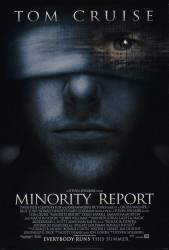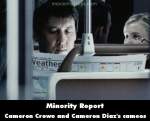Continuity mistake: Lara, wife of John, seemingly has the ability to teleport. She goes from the building where the conference is being held, to the Pre-Crime building to jail break John, and then is back at the conference in the next scene. The time to go from the conference, as the antagonist is about to start his speech, to the pre-crime building, and back to the conference as his speech is ending, seems to break the continuity of time. (02:06:21)
Plot hole: Burgess was supposedly willing to commit murder to avoid losing one precog critical to the precrime effort. Indeed, the precogs are "offline" while Agatha is unavailable. But no system dependent on a key individual can last long or be scalable. At the banquet it is suggested precrime will somehow "go national." For that to happen there would need to be a way to create more precogs, which requires creating brain-damaged children of drug addicts.
Suggested correction: Or, in the mean time since his project's success Burgess has been able to collect the funds and influences to actually breed precogs or some other form of procuring them. In whatever way possible as Burgess is not a moral or ethical man.
Other mistake: At the beginning of the movie, we learn that the precogs "do not see what you intend to do, only what you will do" and that they cannot see suicides. At the end, Burgess intends to kill Anderton but does not go through with it; he commits suicide instead. Given these two facts, the precogs should not have seen Burgess' confrontation with Anderton at the end, and a red ball should not have been created.
Suggested correction: Burgess intention was in fact to kill Anderton, but the knowledge of the precogs predicting his murder attempt, the conflict inside his conscious, and the sound of the arriving helicopters made him change his mind at the last second, just like Anderton did in the apartment. The point is they have a choice, and having knowledge of that, only that, changes the future and makes it different from the visions.
Continuity mistake: When we see the Leo Crow previsions for the first time, we see the numbers "9" and "6" backwards because we are seeing the previsions from behind the screen. But in the cyberparlor we see the previsions from the same side that Anderton and Riley are watching them, and the numbers are still backward.
Continuity mistake: As Witwer tells Laura about John's apartment being full of drugs, she's sitting straight up with her hands at her sides, but in the next shot she has her legs crossed and her arm on the top of the painting. (01:10:20)






